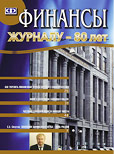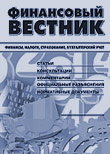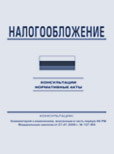Содержание
КАЗНАЧЕЙСТВО: СТАНОВЛЕНИЕ И РАЗВИТИЕ
E-mail: finance-journal@mail.ru
Традиционное подведение итогов работы Федерального казначейства за год и обсуждение задач на 2020 г. состоялось на расширенном заседании Коллегии Казначейства России, которое прошло 18 марта текущего года. В мероприятии приняли участие Министр финансов РФ А.Г. Силуанов, первый заместитель Министра финансов РФ И.Г. Нестеренко, заместитель председателя Совета Федерации РФ Н.А. Журавлев, директор Федеральной службы по финансовому мониторингу Ю.А. Чиханчин, которые выступили с докладами.
Коллегия прошла в формате видео-конференц-связи, в ней приняли участие более 3000 человек.
Ключевые слова: итоги деятельности Казначейства России, направления развития Федерального казначейства, новая архитектура казначейской системы России, главный проект года.
С.Е. Прокофьев, заместитель руководителя Федерального казначейства, заведующий кафедрой «Государственное и муниципальное управление» Финансового университета при Правительстве Российской Федерации, доктор экономических наук, профессор
E-mail: finance-journal@mail.ru
С 2021 г. создается новая модель консолидированного или Единого казначейского счета, в соответствии с которой счета всех публично-правовых образований будут вестись на Едином казначейском счете в Федеральном казначействе с консолидацией на нем всех денежных потоков и остатков соответствующих средств. Платежи указанных органов и организаций будут проводиться по единым новым правилам организации и функционирования Системы казначейских платежей.
Что представляют собой эти новые правила, на каком этапе находятся преобразования и что предполагается реализовать в 2020 г., об этом как раз и ведется речь в данной статье.
Ключевые слова:Федеральное казначейство, Единый казначейский счет, система казначейских платежей, новые казначейские счета, кэш-менеджмент.
ФИНАНСЫ И БЮДЖЕТ: ПРОБЛЕМЫ И РЕШЕНИЯ
Е.А. Ермакова, профессор кафедры финансов и налогообложения Саратовского социально-экономического института (филиала) Российского экономического университета имени Г.В. Плеханова, доктор экономических наук, профессор
E-mail: eae13@mail.ru
В связи с неблагополучной ситуацией по новой коронавирусной инфекции государством принимаются специальные меры поддержки населения и отраслей экономики, оказавшихся в зоне риска. В статье представлена финансовая оценка мер принимаемых не только на федеральном уровне, но и региональный опыт финансово-бюджетной поддержки экономики. Обобщены факторы влияния пандемии на экономику, систематизированы особенности секторального влияния. Проанализированы меры, принимаемые в Саратовской области. Предложены дополнительные финансовые инструменты для поддержки экономики регионов.
Ключевые слова: коронавирус, пандемия, финансовая поддержка населения, государственная поддержка.
К ГОДОВЩИНЕ ВЕЛИКОЙ ПОБЕДЫ
Л.А. Муравьева, доцент Департамента социологии, истории и философии Финансового университета при Правительстве Российской Федерации, кандидат исторических наук
E-mail: lam1812@mail.ru
Великая Отечественная война внесла значительные изменения в основные направления налоговой политики СССР. Главные виды налогов поступали от государственных предприятий и кооперативов. Правительству пришлось изыскивать дополнительные ресурсы для пополнения доходной части государственного бюджета. Резко повысилась доля и значение налогов с населения. Проводилась реорганизация старых и вводились новые налоги: военный, на холостяков и малосемейных граждан. В целом советские финансы и налоговая система выдержали испытания военного времени.
Ключевые слова: Великая Отечественная война, государственный бюджет, доходы, налоги, продовольственная карточка, ресурсы, финансы, экономика.
НАЛОГИ: ТЕОРИЯ И ПРАКТИКА
М.Р. Пинская, руководитель Центра налоговой политики НИФИ, доктор экономических наук
E-mail: mpinskaya@nifi.ru
Статья посвящена проблеме отсутствия налоговых механизмов изъятия горной ренты при добыче твердых полезных ископаемых. Автор утверждает, что в основу НДПИ заложен не рентный, а затратный подход. Выявлены недостатки НДПИ и налога на прибыль организаций через призму изъятия дифференциальной ренты I. Предлагаются меры по совершенствованию налоговых методов изъятия горной ренты при добыче твердых полезных ископаемых.
Ключевые слова: горная рента, горная руда, твёрдые полезные ископаемые, НДПИ, налог на сверхприбыль.
СТРАХОВАНИЕ
Э.С. Гребенщиков, кандидат исторических наук
E-mail: finvestnik@mail.ru
В первой половине 2020 г. индустрия страховых услуг подверглась серьезному испытанию на предмет способности смягчать риски, порожденные пандемией. Эпидемические риски можно отнести к тем катастрофическим рискам, которые давно уже страхуются и хорошо известны страховщикам, как и самим традиционным страхователям. Новым стал масштаб бедствияa, географический и финансовый. Значительные выплаты последуют за отменой запланированных мероприятий, повышением уровня смертности застрахованных, обрывам цепочек поставок. Но главные потери для страховщиков несет спад деловой активности. Часть потерь страховые корпорации могут отыграть, обновляя свои страховые продукты.
Ключевые слова: эпидемические/катастрофические риски, экстремально высокая смертность, убытки, вызванные отменой мероприятий, разрывы цепочек поставок, новые требования регуляторов, обязательное покрытие, правила страхования, перестраховочная защита.
ФИНАНСЫ ЗАРУБЕЖНЫХ СТРАН
И.Ю.Арлашкин, научный сотрудник Института прикладных экономических исследований РАНХиГС, научный сотрудник НИФИ Минфина России
E-mail: arlashkin@ranepa.ru
Н.Е. Барбашова, старший научный сотрудник Института прикладных экономических исследований РАНХиГС, старший научный сотрудник НИФИ Минфина России, кандидат экономических наук
E-mail: barbashova-ne@ranepa.ru
А.Н. Комарницкая, научный сотрудник Института прикладных экономических исследований РАНХиГС
E-mail: komarnitskaya-an@ranepa.ru
В действующей российской методике распределения выравнивающих трансфертов не учитывается большое число объективных факторов, влияющих на стоимость бюджетных услуг, а применяемые коэффициенты требуют актуализации. С 2017 г. в рамках межбюджетного выравнивания применяется новый инструмент – «модельный бюджет», требующий максимальной корректности оценки региональных расходов. В целях совершенствования методологии оценки бюджетных расходов территорий важно изучить международный опыт в данной сфере. В статье рассмотрена практика оценки региональных расходов в Индии, Канаде, Швейцарии, Испании, Италии и Австралии. Проведен анализ достоинств и недостатков зарубежных методик, оценена возможность их частичного применения в России. В статье отмечается перспективность применения эконометрических методов при оценке факторов, влияющих на региональные расходы.
Ключевые слова: фискальное выравнивание, межбюджетные трансферты, зарубежный опыт, оценка расходных потребностей.
ФИНАНСОВЫЕ РЫНКИ
А.С. Ковалевская, ведущий научный сотрудник Центра международных финансов НИФИ Минфина России, кандидат экономических наук
E-mail: ankoval@nifi.ru
Через широкий спектр потенциальных политических и экономических рисков изменение климата воздействует на мировые рынки, трансформирует структуру спроса и предложения и направления финансовых потоков. В этом контексте финансовый сектор должен быть готов к потенциальным изменениям, связанным с климатом. С другой стороны, финансовый сектор может оказать содействие снижению связанных с переходом к «низкоуглеродной» экономике рисков, предложив рынку соответствующие продукты и услуги.
В статье описано влияние изменения климата и необходимости адаптации к его последствиям на финансовый сектор, анализируются вопросы интеграции климатических целей с экономическими и финансовыми аспектами управления, а также роль институциональных инвесторов в климатическом финансировании. Предложены сферы, в рамках которых финансовый сектор может способствовать решению проблем изменения климата.
Ключевые слова: изменение климата, финансовые риски, климатическое финансирование, институциональные инвесторы.
МНЕНИЯ
А.Б. Золотарева, заместитель заведующего лабораторией исследований бюджетной политики Института прикладных экономических исследований РАНХиГС, кандидат юридических наук
Е-mail: zolot@iep.ru
Статья посвящена анализу норм гл. 24.1 Бюджетного кодекса РФ, регулирующей порядок исполнения судебных актов по обращению взыскания на средства бюджетов. Автор приходит к выводу, что, декларируя неограниченную ответственность бюджетов по судебным актам, Бюджетный кодекс РФ не содержит эффективного механизма их принудительного исполнения ни в тех случаях, когда ответчиком является казна, ни в тех случаях, когда ответчиками выступают казенные учреждения. Вместе с тем, по мнению автора, повышение ответственности бюджетов перед кредиторами предполагает установление пределов такой ответственности, поскольку в противном случае неконтролируемые взыскания по судебным актам могут поставить под угрозу нормальное исполнение бюджетов.
Ключевые слова: иммунитет бюджета, иски к бюджету, иски к государству, списание с бюджетных счетов, судебные акты против бюджета.
Content
TREASURY: FORMATION AND DEVELOPMENT
E-mail: finance-journal@mail.ru
The traditional summing up of the work done by the Federal Treasury over the past year and discussion of tasks for 2020 was held at an expanded meeting of the Board of the Treasury of Russia, which was held on March 18. The event was attended by the Minister of finance of the Russian Federation A.G. Siluanov, First Deputy Minister of Finance of the Russian Federation I.G. Nesterenko, Deputy Chairman of the Council of the Federation of the Russian Federation N.A. Zhuravlev, Director of the Federal Financial Monitoring Service Yu.A. Chikhanchin who made their presentations.
The college was held in the format of video conferencing meeting, more than 3,000 people took part in it.
Keywords: results of the activities of the Treasury of Russia, directions of development of the Federal Treasury, new architecture of the treasury system of Russia, the main project of the year.
S.E. Prokofiev, deputy head of the Federal Treasury, head of the Department of state and municipal management, Financial university under the Government of the Russian Federation, doctor of economics, full professor
E-mail: finance-journal@mail.ru
Since 2021, a new model of the consolidated (unified) treasury account has been created, according to which the accounts of all public-law entities will be kept on the unified treasury account in the Federal Treasury with the consolidation of all cash flows and balances of the corresponding funds on it. Payments of these bodies and organizations will be carried out according to the new unified rules for the organization and functioning of the Treasury payment system.
The article is about these new rules, the current stage of the transformation and plans for 2020.
Keywords: Federal Treasury, single treasury account, system of treasury payments, new treasury accounts, cash management.
FINANCE AND BUDGET: PROBLEMS AND SOLUTIONS
E.A. Ermakova, professor, Department of finance and taxation, Saratov socio-economic institute (branch), G.V. Plekhanov Russian university of economics, doctor of economics, full professor
E-mail: eae13@mail.ru
In connection with the unfavorable situation of the new coronavirus infection, the author points to the sectors of economy that are at greater risk. She describes measures at federal level, but also the regional experience of financial and budgetary support for the economy. The factors of the impact of the pandemic on the economy are summarized, the characteristics of sectoral influence are systematized. The measures taken in the Saratov region are analyzed. Additional financial instruments are proposed to support the regional economy.
Keywords: coronavirus, pandemic, financial support of the population, state support.
75-th ANNIVERSARY OF THE GREAT VICTORY
L.A. Muravyova, candidate of history, associate professor of the Department of sociology, history and philosophy, Financial university under the Government of the Russian Federation
E-mail: lam1812@mail.ru
The Great Patriotic War made significant changes to the main directions of tax policy of the USSR. The main types of tax arrived from the state enterprises and cooperatives. The government had to find additional resources for replenishment of revenues of the state budget. Sharply the share and value of taxes on the population raised. Reorganization of old was carried out and new taxes were imposed: the military, on bachelors and small-family citizens. In general the Soviet finance and tax system passed tests of wartime.
Keywords: Great Patriotic War, state budget, income, taxes, food-card, resources, finance, economy.
TAXES: THEORY AND PRACTICE
M.R. Pinskaya, doctor of economics, head of the Center for Tax Policy at The Federal Research Institute of the Ministry of Finance of the Russian Federation
E-mail: mpinskaya@nifi.ru
Article is devoted to the problem of the absence of the mechanisms of withholding of the rental incomes derived when extracting the solid mineral products. The author argues that the tax on extraction of minerals employs rent-based but not cost-based approach. Several deficiencies of the tax on extraction of minerals and of corporate income tax are explored in the context of the differentiated rent. Measures are proposed aimed at reforming of the tax methods of withholding the rental income when extracting the mountain solid mineral products.
Keywords: rental income, ore, solid mineral products, tax on extraction of minerals, extra-profit.
INSURANCE
Eduard S. Grebenshchikov, Dr
E-mail: finvestnik@mail.ru
In the first half of 2019 the potential of insurance industry was tested to withstand serious risks of catastrophic character generated by epidemy of Covid -19. The risks were well-known but their scope was unprecedent. They are supply chains breakdowns, losses caused with cancellation of events (like Tokyo Olympic Games), travel bans, payouts due to extreme mortality. Significant share of these risks was insured, some even were covered by stand-alone policies. The response of Chinese, Russian insurers and insurance communities in South-East Asia described in the article. Special attention paid to changes introduced lately into legislation by regulators, who are inclined to raise statutory capital levels for companies or even to force insurance providers to assume epidemic risks in future deals. Still the major blow delivered to insurance system was made not by direct losses (indemnities paid) but by economic restrictions and business closures.
Keywords: epidemic risks, extreme mortality, cancellation of events, compulsory insurance cover, capital reserves, repeal of contracts, World bank, pandemic emergency fund, revised insurance policies.
FINANCE OF FOREIGN COUNTRIES
I. Yu. Arlashkin, Researcher at the Institute of Applied Economic Research, RANEPA, Researcher at the Federal research Institute of the Ministry of Finance of the Russian Federation
E-mail: arlashkin@ranepa.ru
N. E. Barbashova, Senior Researcher, Institute of Applied Economic Research, RANEPA; Senior Researcher, The Federal research Institute of the Ministry of Finance of the Russian Federation, Candidate of economic sciences
E-mail: barbashova-ne@ranepa.ru
A.N. Komarnitskaya, Researcher, Institute of Applied Economic Research, RANEPA
E-mail: komarnitskaya-an@ranepa.ru
Article is devoted to the problem of the absence of the mechanisms of withholding of the rental incomes derived when extracting the solid mineral products.The current Russian methodology for distributing equalizing transfers does not take into account a large number of objective factors affecting the cost of budget services, and the applied coefficients require updating. Since 2017 intergovernmental relations use a new tool - the “model budget”, which requires maximum accuracy in assessing regional costs. In order to improve the methodology for assessing budgetary expenditures of territories, it is important to study international experience in this area. The article discusses the practice of Australia. The advantages and disadvantages of foreign methods are analyzed, the possibility of their partial application in Russia is evaluated. The article notes the prospects of using econometric methods in assessing factors which affecting regional spending.
Keywords: fiscal equalization, intergovernmental transfers, international practice, assessing of regional spending.
FINANCIAL MARKETS
A.S. Kovalevskaya, Leading Researcher, Center for International Finance, The Federal research Institute of the Ministry of Finance of the Russian Federation, Candidate of economic science
E-mail: ankoval@nifi.ru
Climate change makes an impact on global markets through a wide range of potential political and economic risks; it transforms the supply and demand and financial flows direction. In this context, the financial sector should be ready for potential climate-related changes. On the other hand, the financial sector can help reduce the risks associated with the transition to a low carbon economy by offering relevant products and services to the market.
The article describes the impact of climate change and the need of adaptation to its consequences on the financial sector; it analyzes the integration of climate goals with the economic and financial management aspects, as well as the role of institutional investors in climate finance. Areas where the financial sector can contribute to solving climate change problems are proposed.
Keywords: climate change, financial risks, climate finance, institutional investors.
OPINIONS
A.B. Zolotareva, Institute for applied economic research, Russian presidential academy of national economy and public administration, candidate of sciences (law)
Е-mail: zolot@iep.ru
The article is devoted to the analysis of the norms of Chapter 24.1 of the Budget code, which regulates the order of execution of judicial acts on foreclosure on budget funds. The author concludes that, while declaring unlimited liability of budgets for judicial acts, the Budget code does not provide an effective mechanism for their enforcement, either in cases where the defendant is the Treasury, or in cases where the defendants are other state institutions. At the same time, according to the author, increasing the responsibility of budgets to creditors implies the establishment of limits of such responsibility, since otherwise uncontrolled penalties under judicial acts may jeopardize the normal execution of budgets.
Keywords: immunity of the budget, lawsuits against the budget, lawsuits against the state, foreclosure on budget accounts, judicial acts against the budget.













